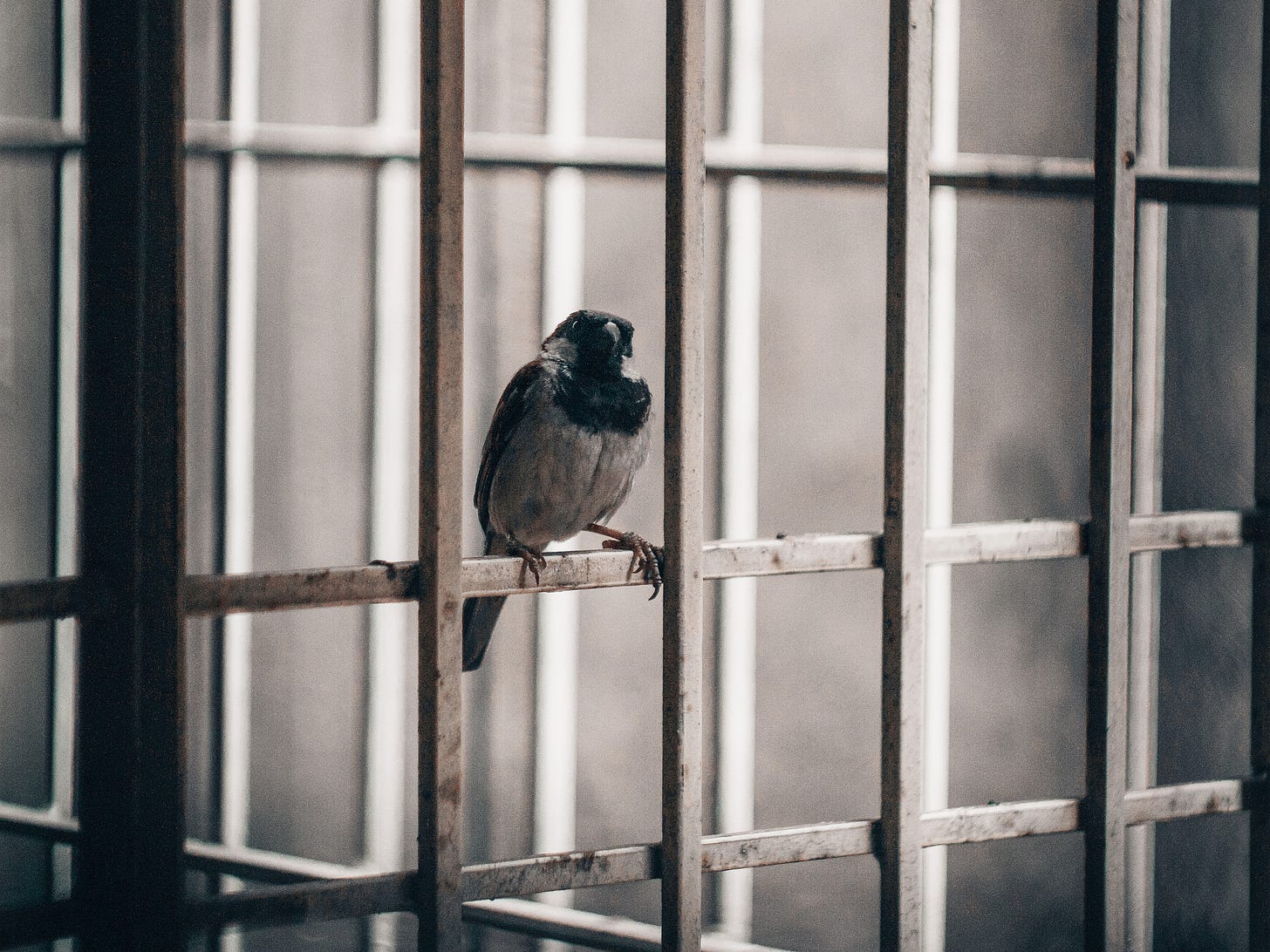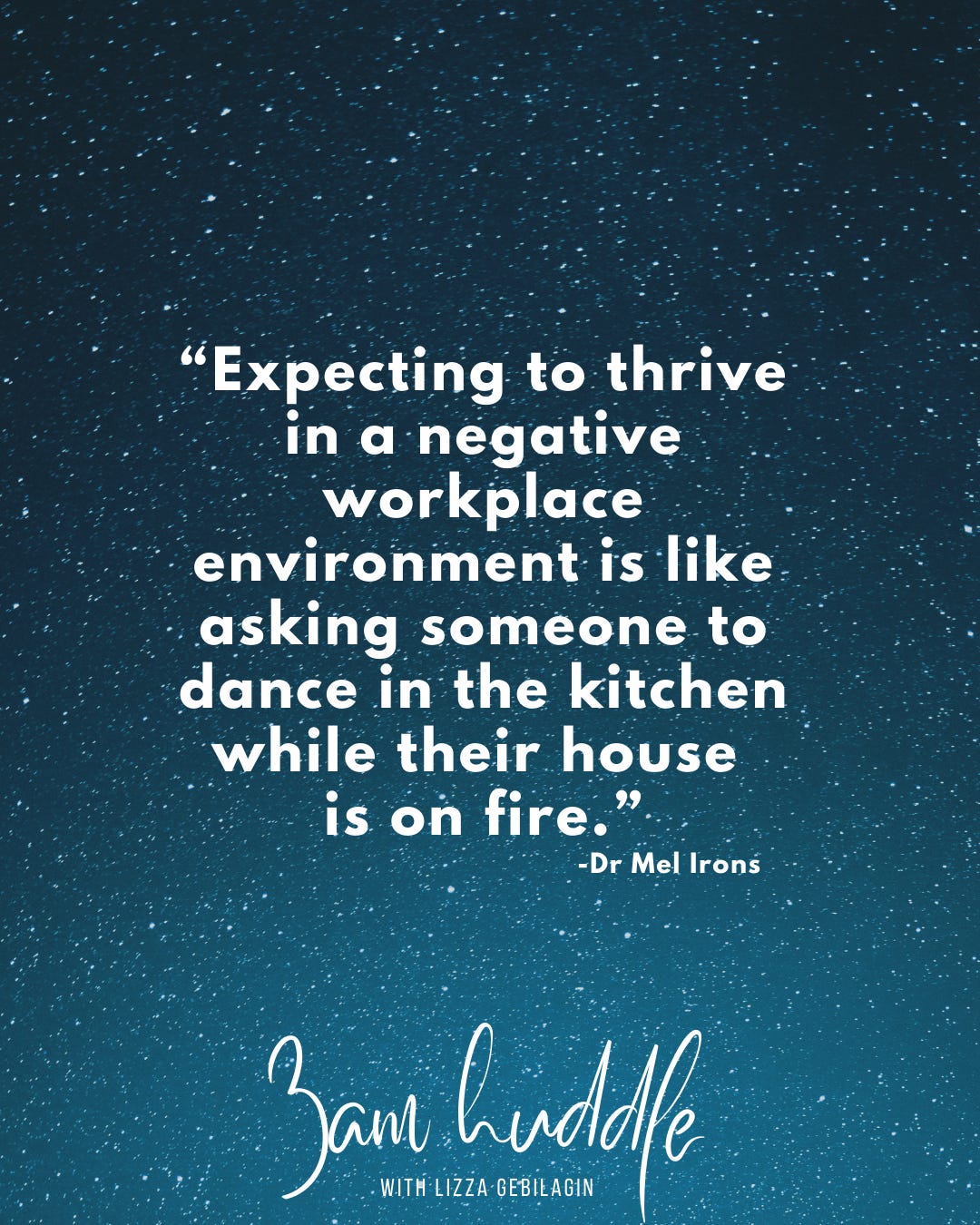“If today were the last of my life, would I want to do what I am about to do today?”
I could hear Steve Jobs’ words from his famous Stanford commencement speech in my head. It was a speech I’d listened to over and over at a point in my life when I was too scared to follow my heart and I needed the courage to divert from the path that was making me so unhappy.
That day, as I stood in front of the bathroom mirror before work and looked myself in the eyes, the answer to Steve’s question was a hard no.
No.
Nope.
Fuck no.
In fact, I felt physically ill thinking about what I had to do that day. What I’d been doing for the past few months. I couldn’t sleep properly. I was so exhausted but my mind wouldn’t let me rest as it pinged awake at 3am, alert, replaying the previous day's events and working on ways to survive another one.
It was hard to pinpoint exactly what made my new workplace so toxic. Was it the unrealistic targets that we’d fail to hit every day, no matter how hard everyone worked?
Was it the way that some key people made snide comments about others’ work behind their backs – not because they were horrible people (at least I didn’t think they inherently were) but because the atmosphere was such that staff were pitted against each other under the guise of appealing to the team’s “competitive nature”?
Was it because there was so much micromanagement that no matter what any of us did, it felt like we were always doing the wrong thing? Was it because there was no leadership but a willingness to quickly point fingers when things didn’t work?
Was it because in the space of four months, we had three different managers? Could it have been because a different staff member resigned every two to three weeks?
Or was it having to churn out intentionally divisive content that just didn’t sit well with me?
Whatever the reasons for it, I didn’t know if I could survive the toxicity as it kept chipping away at my core. But I had to find a way while I worked on my escape plan.
When I spoke to friends/family/former colleagues/baristas/my hairdresser about it, almost everyone had a similar experience with different outcomes.
Some suggested making the most of a really shit situation by working out what you need to get out of a toxic workplace (for example, it could be a certain type of experience on your CV for your next job, or savings for a big goal, like a home deposit or overseas move).
The person who suggested the above held out for two years (I don’t know how; she doesn’t remember either) and, thanks to the experience, went on to score her dream job next. She’s very happy now.
Others told me how they cried every day at work. Others tried to make the most of the weekends to get work out of their system before starting a new week. Other people held on to their weekly workout routines as a way to mentally survive. Another waited for a redundancy.
My survival mode looked like this: I mustered whatever energy I had left to do my best work and find ways I could still make a positive impact within the confines I’d been given. I tried to appreciate the job for everything I was learning. Whenever something incredulous happened, I laughed (sometimes in my head, sometimes out loud with a colleague) at the absurdity that a place like this actually existed.
I tried not to take any of it personally but I did get pissed off when people who should know how to act better didn’t. And while I didn’t agree with some people’s behaviour, I understood that it wasn’t necessarily them but the environment that fostered it.
Doing all this helped, but only a little. I still felt sick every day I went to work.
The relief was overwhelming when I finally left that job. Only a few weeks later, my parents asked me if I had gotten Botox done because I looked so much younger (ha! Thanks, Mum and Dad). There were no injectables involved; My anti-ageing secret was leaving a toxic workplace. That right there shows how much that job was draining my soul.
I really, really, really, really, really hope I never end up in a toxic workplace again. But if I do (God help me!), or if you’re experiencing this right now and need a professional’s insight, I reached out to Psychologist and Director of Organisational Development of The Lumery, Dr Mel Irons to us help navigate the shit storm.
Lizza: When people asked me what made my work so toxic, I found it hard to explain. So I wondered, from your expert POV, what does make a work environment feel toxic?
Dr Mel Irons: Toxic workplaces come in a variety of shapes and sizes. People who work in places that might be described as 'toxic' can experience things like:
a disregard for wellbeing in favour of output
excessive micromanagement which represents a leader's low trust in people's abilities
power struggles and political behaviour
unaddressed conflict
backstabbing (or in Kim Scott's great work, 'manipulative insincerity')
subtle undermining
cliques and exclusivity
unrealistic workloads and job demands
lack of transparency
cultural insensitivity
inequitable treatment
negative gossip
resistance to change/lack of innovation.
And of course, bullying, discrimination and harassment.
The language around 'what makes a work environment FEEL toxic' is also telling – it underscores the subjectivity inherent in the term, as everyone's reality is different, and what may feel "toxic" to you may not feel that way for me.
That does make this, like anything to do with culture and people, a tricky space to be in.
It can also be helpful to point out what is not a 'toxic workplace'. What I mean by this is that we need to be cautious about automatically misconstruing a demanding or challenging work environment as a toxic one.
Some workplaces are high-pressure or rigorous, and there is an expectation that people will engage in hard work and be extremely dedicated. There will also be moments of stress and discomfort in every job. Clarifying expectations up front is absolutely essential, so everyone is on the same page, and open discussions can be had.
For example, it may be perfectly fine, in a respectful, kind, and fair organisation, to be told what to do; to be asked to meet reasonable deadlines; to be expected to do challenging things. This is not necessarily or automatically toxic.
Open lines of communication are essential, however, to ensure that the expectations are still clear, and that everyone is feeling okay.
We also know it can be really hard to 'speak truth to power', even in places with high psychological safety (the belief you can say what you think, be who you are, and contribute without fear of things like judgement/repercussions etc) - so leaders have a responsibility to lean in and ask the questions of their staff, rather than hoping their staff will always have the courage to speak up.
Lizza: How can a toxic work environment impact a person's wellbeing? For me, I couldn’t sleep at all and I was starting to question whether I was actually good at what I do.
Dr Mel Irons: I would say the more powerful question here is ‘How can it not impact a person's wellbeing?’
We know from decades of research by academics and practitioners like Professor Michael Leiter that even "minor" incidents of incivility (a fancy way of saying 'bad manners or being rude') can significantly impact a person – leading to things like reduced motivation, reduced trust in the leadership in their organisation, and increased intentions to leave (or actual turnover).
Hostile, unsafe, exclusive, manipulative environments can have a profound impact on everyone, whether the impacts are visible or not.
Like many things there is a continuum here, and the further along the 'toxicity continuum' a workplace feels to be, the greater the potential impact on an individual.
The impact on individuals can come out in various ways, such as self-doubt, wavering confidence, incessant self-questioning, and excessive mental energy spent on rehashing past scenarios or rehearsing future ones.
Sleeplessness and the inability to switch off from work-related concerns become commonplace. Individuals may find themselves compelled to take more frequent leave days or actively avoid particular colleagues or work situations as a means of self-preservation.
It's a real waste of emotional and cognitive energy, to be honest - energy that could be better spent elsewhere.
Lizza: Is it possible to thrive in a toxic environment? (I asked myself this over and over.)
Dr Mel Irons: Expecting to thrive in a negative workplace environment is like asking someone to dance in the kitchen while their house is on fire. It's not fair or reasonable.
We have to be so careful with over-individualising the 'solutions' to complex workplace problems. While everyone is responsible for their own behaviours, expecting people to 'thrive' when, in fact, it is the environment around them making that kind of flourishing impossible isn't fair.
Lizza: So, if we can't thrive in a toxic environment, how can we survive one? Especially when we feel stuck in the job.
Dr Mel Irons: Here's the intriguing twist, and where some mental gymnastics may be required for a period of time. While it might seem unfair to expect someone to "thrive" in less-than-ideal workplace conditions, we need to face the truth of diverse circumstances.
Sometimes, we find ourselves in less-than-ideal situations – whether due to financial constraints, family commitments, or immigration necessities. Or, we might encounter the subtle but relentless "creeping normality" effect, where countless imperceptible changes gradually reveal that our current environment is far from ideal, but it took us a while to see it.
There are plenty of suggestions I know you'll have encountered before, so I won't mention them here (they can all be effective, but this is not new news to you - things like adopting a mindfulness practice so you can become less reactive and less attached; looking after your wellbeing pillars as much as you can, such as sleep and exercise; planning for the future; reframing your perspective etc.)
[Lizza’s note: Dr Irons was right! I was trying to do all that: meditating every night before bed, trying(!) to get a good sleep, planning my escape, and reframing my experience, but I was still struggling.]
For now, I'll give three different suggestions for managing a less-than-ideal work situation until you can leave.
To be clear - if you can go, go. If you can't, or can't yet, you need to find ways to get through with minimal damage to you. These strategies are tailored for situations where you've recognised that influencing the workplace culture or environment isn't feasible or isn't your current priority.
In such cases, your goal is simply to endure until you can make your exit. Sometimes, self-preservation takes precedence, and you'll have the capacity to contribute positively later. For now, I guess you could say these are survival tactics:
1. Hit "Audience Mode"
Pretend you have a big shiny button and when you press it, the world around you transforms into a magnificent old theatre, and you are in one of the plush chairs in the audience.
There is a dramatic or scary or funny show playing out on the stage. You've become part of the audience, not the show. Just watch the show as it carries on - you can see it, and you're there, you're present, but you aren't really a part of it. You're detached.
This is a technique you'd find in an approach like Acceptance and Commitment Therapy (The Happiness Trap is a very good read and one I recommend to pretty much all my clinical psychology clients). Just hit the button, and boom - you have some separation and space. Just observe what's happening on the stage without getting all caught up in it.
2. Write a "Leadership Lessons List"
One day, you'll be a leader - maybe of a company, maybe of a club or friendship group or family. Jot down what you've learnt about good and poor leadership from your current environment.
You may not be able to create the kind of leadership environment you want right now, or even in five or ten years, but one day you may be able to seriously impact others around you by the sort of environment you create.
3. If you can't fix it or change it, at least don't make it worse
Leave knowing that, sure, you may not have fixed it or changed it, but you didn't make things worse for anyone with your own behaviour. Be as true as you can to your own values in this environment so you can leave with an intact sense of self.
Lizza: Is there any way a toxic workplace can change if that toxicity is coming from the top?
Dr Mel Irons: You always have influence. Always. How far your sphere of influence goes is not completely under your control, but everyone has the power to influence.
None of us ever – EVER – will truly appreciate the influence we have over others or our environment. The extent of our impact on others is rarely within our grasp.
Your biggest personal question to answer is, whether the effort is worth it. Is the effort worth the sweat and the sacrifice?
We have heard a lot about "grit" in the literature from researchers like Duckworth, and perseverance is essential.
But, we also know from experts like psychologist Susan David (author of Emotional Agility) that there is also immense wisdom in knowing when to quit - to pivot; to cut your losses and to apply your strengths in a more promising direction elsewhere when the timing is right or possible.
PS It’s Lizza here again. I loved Dr Irons' advice - kinda wish I had it when I needed it. Did any of it resonate with you? Let me know by replying or adding a comment.
Until our next 3am Huddle
Lizza x







Fantastic read Lizza. Thank you for sharing your experience and shining light on both the issue, and potential solutions for others to follow. Great Work!